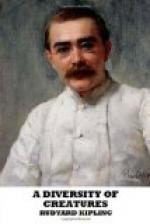‘There’s no need,’ said Ollyett. ’The whole press is on the buckle from end to end.’
Even Woodhouse was a little astonished at the ease with which it had come about, and said as much.
‘Rot!’ said Ollyett. ‘We haven’t really begun. Huckley isn’t news yet.’
‘What do you mean?’ said Woodhouse, who had grown to have great respect for his young but by no means distant connection.
’Mean? By the grace of God, Master Ridley, I mean to have it so that when Huckley turns over in its sleep, Reuters and the Press Association jump out of bed to cable.’ Then he went off at score about certain restorations in Huckley Church which, he said—and he seemed to spend his every week-end there—had been perpetrated by the Rector’s predecessor, who had abolished a ‘leper-window’ or a ‘squinch-hole’ (whatever these may be) to institute a lavatory in the vestry. It did not strike me as stuff for which Reuters or the Press Association would lose much sleep, and I left him declaiming to Woodhouse about a fourteenth-century font which, he said, he had unearthed in the sexton’s tool-shed.
My methods were more on the lines of peaceful penetration. An odd copy, in The Bun’s rag-and-bone library, of Hone’s Every-Day Book had revealed to me the existence of a village dance founded, like all village dances, on Druidical mysteries connected with the Solar Solstice (which is always unchallengeable) and Mid-summer Morning, which is dewy and refreshing to the London eye. For this I take no credit—Hone being a mine any one can work—but that I rechristened that dance, after I had revised it, ‘The Gubby’ is my title to immortal fame. It was still to be witnessed, I wrote, ’in all its poignant purity at Huckley, that last home of significant mediaeval survivals’; and I fell so in love with my creation that I kept it back for days, enamelling and burnishing.
‘You’s better put it in,’ said Ollyett at last. ’It’s time we asserted ourselves again. The other fellows are beginning to poach. You saw that thing in the Pinnacle about Sir Thomas’s Model Village? He must have got one of their chaps down to do it.’
‘’Nothing like the wounds of a friend,’ I said. ’That account of the non-alcoholic pub alone was—’
’I liked the bit best about the white-tiled laundry and the Fallen Virgins who wash Sir Thomas’s dress shirts. Our side couldn’t come within a mile of that, you know. We haven’t the proper flair for sexual slobber.’
‘That’s what I’m always saying,’ I retorted. ’Leave ’em alone. The other fellows are doing our work for us now. Besides I want to touch up my “Gubby Dance” a little more.’
’No. You’ll spoil it. Let’s shove it in to-day. For one thing it’s Literature. I don’t go in for compliments as you know, but, etc. etc.’
I had a healthy suspicion of young Ollyett in every aspect, but though I knew that I should have to pay for it, I fell to his flattery, and my priceless article on the ‘Gubby Dance’ appeared. Next Saturday he asked me to bring out The Bun in his absence, which I naturally assumed would be connected with the little maroon side-car. I was wrong.




